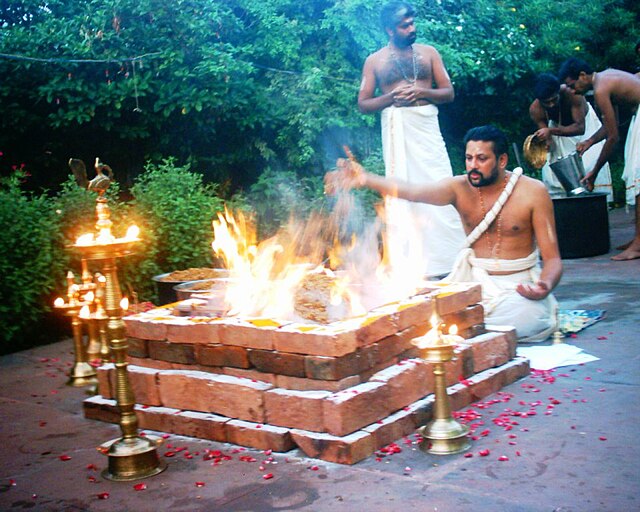Atri or Attri is a Vedic sage, who is credited with composing numerous hymns to Agni, Indra, and other Vedic deities of Hinduism. Atri is one of the Saptarishi in the Hindu tradition, and the one most mentioned in its scripture Rigveda.
Rama visiting Atri's hermitage. As Atri talks to Rama and his brother Lakshmana, Anusuya talks with his wife Sita
Atri statue at Atreyapuram village of AP.
A Bhagavata Purana manuscript page depicting the story of Atri and Anasuya meeting the Trimurti (PhP 4.1.21–25) (paper, late 18th century, Jaipur)
Left to right: Atri, Bhrigu, Vikhanasa, Marichi and Kashyapa.
Historical Vedic religion
The historical Vedic religion, also known as Vedicism and Vedism, constituted the religious ideas and practices prevalent amongst the Indo-Aryan peoples of the northwest Indian subcontinent during the Vedic period. These ideas and practices are found in the Vedic texts, and some Vedic rituals are still practiced today. The Vedic religion is one of the major traditions which shaped Hinduism, though present-day Hinduism is significantly different from the historical Vedic religion.
A Yupa sacrificial post of the time of Vasishka, 3rd century CE. Isapur, near Mathura. Mathura Museum.
A Śrauta yajna being performed in Kerala
Detail of the Phra Prang, the central tower of the Wat Arun ("Temple of Dawn") in Bangkok, Thailand, showing the ancient Vedic god Indra and three-headed Erawan (Airavata).[citation needed]
The hymn 10.85 of the Rigveda includes the Vivaha-sukta (above). Its recitation continues to be a part of Hindu wedding rituals.








